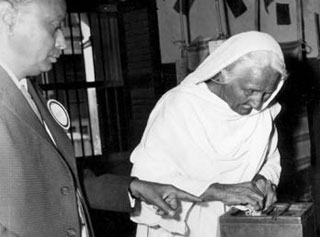The 2014 general elections are just around the corner. In the 66th year of our independence, we must take an oath to not sell our votes and our self-respect, to not vote in the name of caste, creed or religion. Instead, we must choose those candidates who are committed to a corruption-free and crime-free society.
Trilochan Sastry of the Association for Democratic Reforms says that if you don't sell your votes, you are helping clean up politics

The Lok Sabha elections are being held in nine phases from April 7 to May 12, 2014. This may be a golden opportunity for all of us to change things for the better. The percentage of voting has gone up, people are frankly expressing their opinions about the government, and when required, coming out on the streets to protest inaction and wrongdoings.
The Supreme Court and Election Commission of India have also taken important steps to improve the electoral process and clean up the political system. For instance, the Supreme Court recently pronounced that trials of MLAs and MPs should be completed within one year and those convicted should be immediately disqualified. This is an important decision since 30% of MPs and 31% of MLAs in India (162 in the Lok Sabha and over 1,200 in various State Assemblies) have criminal charges against them. About 14% of sitting MPs have serious criminal charges against them, such as murder, financial fraud, crimes against women, kidnapping, and so on. The Election Commission is also ensuring that candidates provide detailed information on assets, liabilities, criminal cases and educational qualifications. This information is in the public domain and can be seen on the Election Commission website as well as the Association for Democratic Reforms websites (www.adrindia.org andwww.myneta.info).
Apart from criminalization, the problem of corruption plagues our system. The Election Commission says tens of thousands of crores of black money or untaxed money is spent during elections. Those who spend such money use their positions as MPs to recover it, mostly from our hard-earned money, that is, from taxes. Politicians also give contracts to and do favours for those who fund their elections. This leads to bad governance and affects roads, public transport, water, electricity, government schools, hospitals, law and order, and so on. Votes are bought with money, liquor, clothes and other gifts. But what are we selling our votes for? We get a couple of thousand rupees but in exchange we lose perhaps lakhs worth of government provisions that could have been spent on rations, water, drainage, garbage clearance, etc.
The Central Government budget expenditure this year is Rs 17,60,000 crore. An all-India survey shows that people want jobs, basic services like water, electricity, education, roads, public transport and security for women. With the budget the government has at its disposal, there is enough and more money to make this happen. Not voting or selling our vote for a few thousand rupees guarantees a bad government. We need to spread awareness about our candidates and political parties and then vote. Fair, clean elections means good governance. Citizens alone can make this happen.
Trilochan Sastry is the founder-chairman of the Association for Democratic Reforms (ADR), an organization which has been working consistently for electoral and political reforms.
Casting a vote once in five years is not enough for a democracy to thrive; its citizens must ensure that they engage on a regular basis with the government as participants.
With this in mind, we share with you information about laws that can help citizen participation in governance and those not yet passed that need your advocacy and support.
We can demand accountability and transparency with these tools
No comments:
Post a Comment